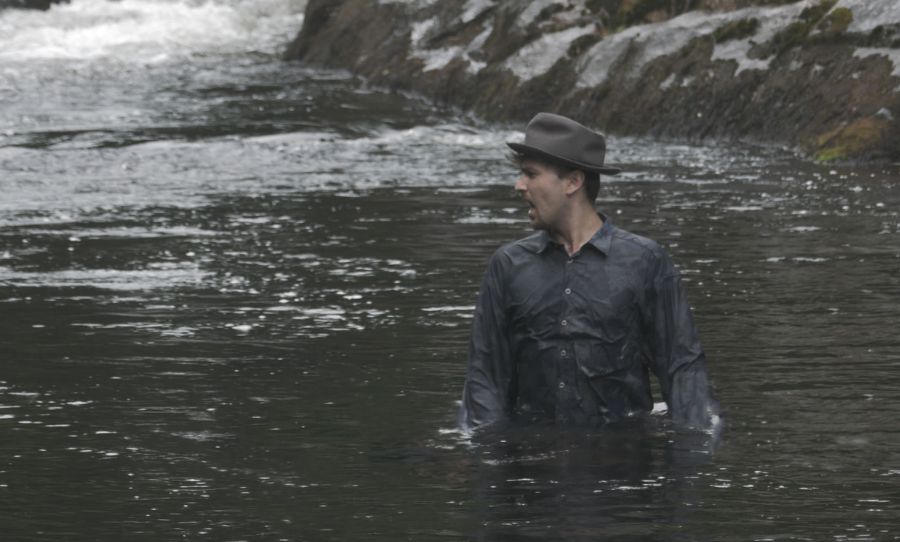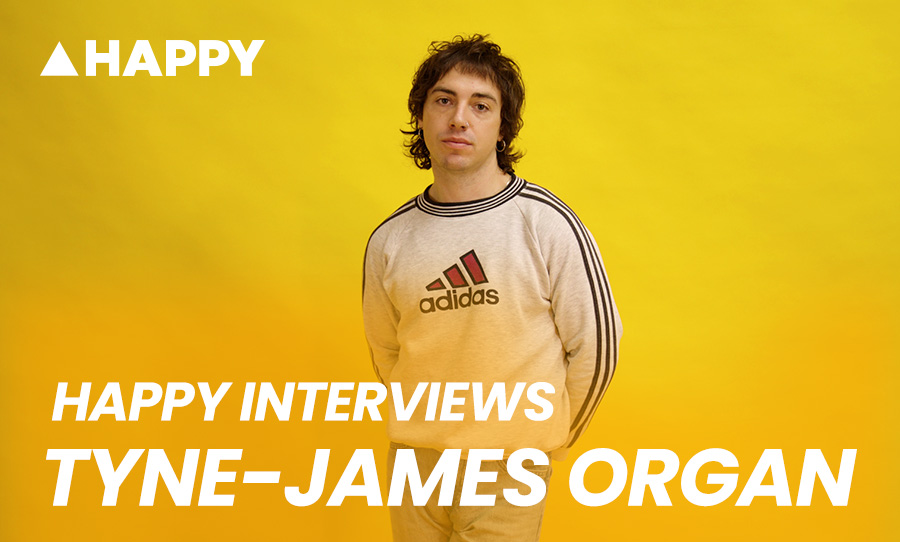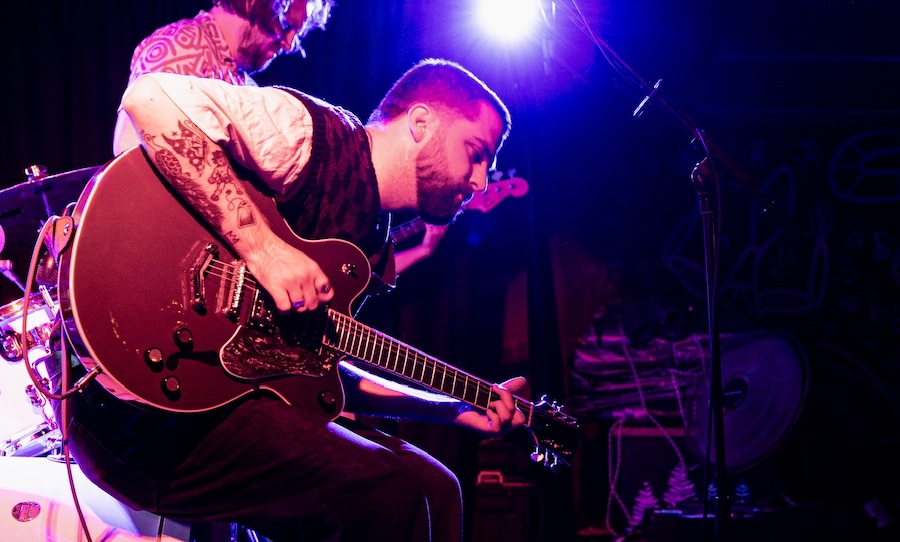Dive into the introspective world of Kid Lazuras, as we embark on a journey of “Utopia”
With a cuppa in hand and a penchant for quiet days, Kid Lazuras takes us behind the scenes of his creative haven. The artist, hailing from Bristol, weaves together influences from new-wave, electronic, and post-punk realms. As we delve into his introspective debut, the album artwork’s lush visuals mirror the emotional intricacies of the sonic landscape he’s crafted.
From serene woodlands to reflective soundscapes, Kid Lazuras bridges the gap between personal experiences and resonant narratives. Join us as we explore the delicate balance between electronic and acoustic elements, and how they interplay in tracks like “In Ether.”
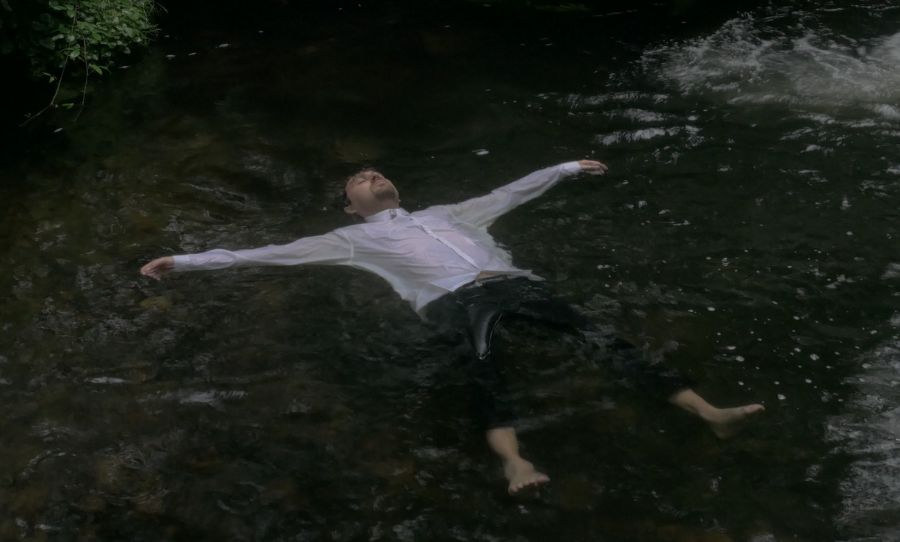
Through candid conversations, Kid Lazuras paints a vivid picture of his artistic evolution, inviting listeners to share in his moments of resilience, growth, and acceptance within the realm of “Utopia.”
Happy: What are you up to today?
Kid Lazuras: Nothing major, I’m enjoying my days quiet at the moment. I just woke up, had a shower, and am now doing this interview with a cuppa.
After this I’ll start mixing in the drums for my second album and a few singles I’ll be releasing over the next six months or so.
I’m quite proud of it to be honest, to me ‘Utopia’ feels like I’m finding my style, this new one feels like I’m refining it.
But once I’ve done that I’ll probably do some painting with my partner. We’re making things to go on our walls at the moment, and it’s quite funny painting together.
She makes these incredibly abstract pieces, they speak to something really honest and raw.
I can just about draw Tails from Sonic. So it’s quite funny seeing how those things combine!
Tell us about where you are from? What’s the scene like in your neck of the woods?
Happy: I’m originally from Devon, though my time has been split between there and Bristol the last few years, and Bristol is a permanent fixture now.
Kid Lazuras: Devon had my heart and soul, beautiful coastline, incredible moorland, and forests and rivers that feel filled with spells.
There are a few places that feel really magical, more so than anywhere else I’ve been. But it’s very very quiet.
A beautiful place to raise a family, less so I think if you want good access to music and culture.
And Bristol gives that – it’s such a melting pot. So many different cultures and experiences crashing together to make a place really beautiful.
I’m usually drawn away from cities, the grey walls and bust faces feel alien to me, but Bristol is quite different.
The walls are covered in pure free expression and whilst people are busy they have a kind of grassroots collective independence that makes its scene feel very genuine.
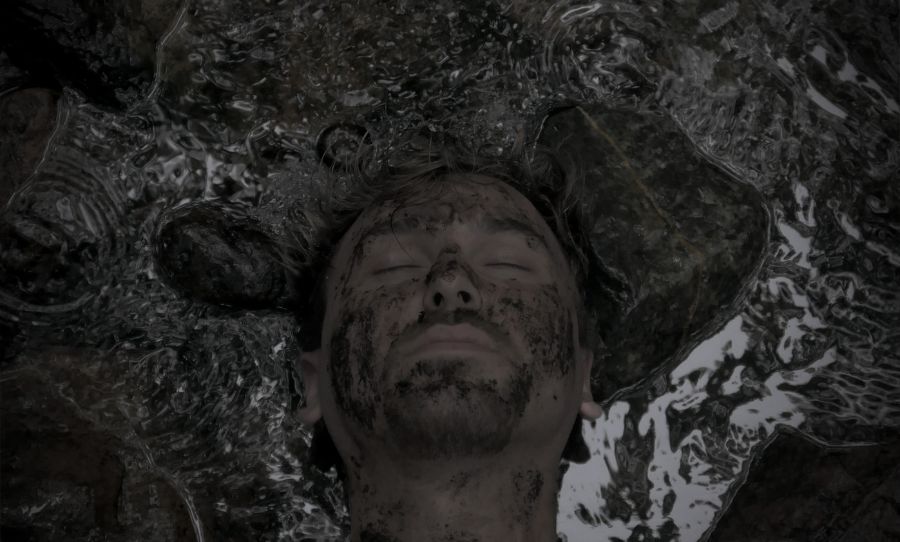
Happy: Describe an average day?
Kid Lazuras: I think I’m still trying to find that myself! But I guess my average day at the moment is a quiet day.
I spend a little bit of time working on music and then spend the rest of it doing something peaceful with my partner.
Maybe paint, maybe watch a film, cook a big dinner, play some chess. Things have been chaotic in my world for too long so I think I’m just becoming a real fan of the quiet life.
Our friends call us an old couple – we’re only 22 and 23… but to be fair we do carry a lot of old person energy. Wouldn’t want it any other way though.
Happy: What did you listen to growing up that fuelled your passion for music?
Kid Lazuras: My earliest musical memory (and one of my earliest memories) was discovering the piano when I was about 4, maybe 5.
I spent the day writing a song for my dad whilst he was at work. As far back as I can remember I’ve always been obsessed with how sound can express thoughts and emotions with a purity and honesty that words just can’t, and I think that’s what really drove my passion.
Finding a way to say things without saying things, and saying them clearer, and more truthfully.
I have a very clear memory of the first time I heard ‘O Children’ by Nick Cave and the Bad Seeds.
To make something so beautiful out of such sadness blew me away. It’s the one song I can rely on to make me cry.
The way the whole song grows, so much going on but weaving a perfect tapestry, in and out of each other, dense but spacious, and the purest emotional expression I’ve heard.
The combination of Cave’s poetry and the all-female choir. That kind of hopeless hope, it’s a spiritual experience.
But at the same time, I’ve never had a clue what it’s about. Every time I hear it there’s a different story.
For someone to make such beautiful sadness, whilst having a story that’s so specific but so vague, transferrable to basically any situation, but still so honest and raw, it really stuck with me.
And then there’s the other end of the spectrum… I was obsessed with ‘Bohemian Like You’ by The Dandy Warhols when I was little.
So much so I made my mum listen to it on loop for about 5 hours, non stop. It’s playful, pure joy.
But in no way blind to the world. It’s honest about the pains, complications, difficulties, and mundane things, but choosing to rise above them, choosing to have fun in the face of them.
That hedonistic playfulness in response to the daily drag affected me – life can be a drag, it can be mundane, filled with irritating complications, so take it easy, don’t get bogged down in it, and try to enjoy the little things that keep it bright.
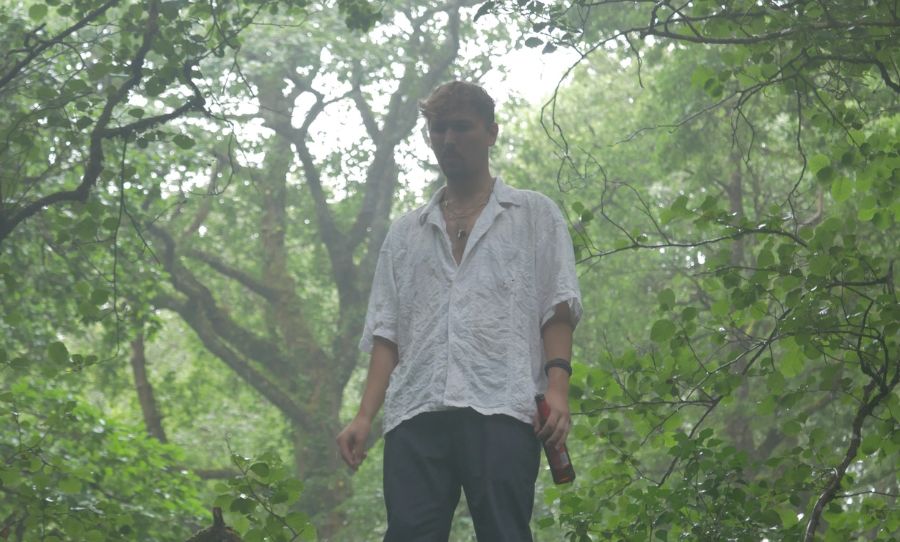
Happy: Your debut album ‘Utopia’ delves into themes of resilience and introspection. How did your personal experiences shape the sonic landscape of the album and guide you through the process of crafting such a diverse range of emotional narratives?
Kid Lazuras: The album is almost like a therapy session. It delves into trauma and its results, and the ways in which we try to fight that, whether by actively confronting it, channelling our feelings into things ‘outside’ of us or ‘bigger’ than us, or just doing whatever we can to avoid and escape.
A lot of the album is a reflection on that. It opens with Fall For The Break, which recounts an experience when I was 17 caused by the mechanisms I had for escaping my world – this is the trigger for everything that follows.
‘Men Of God’, ‘In Ether’, and ‘Utopia’ then try to understand ‘Fall For The Break’ by confronting the experiences and thought processes that led to it.
Eventually, this becomes too painful, so you focus your negative feelings on more external, immediate, rather than underlying psychological things.
This brings about ‘All Over Again’, ‘You Find’, and ‘Run On Out’. The instrumentals of these three are so much brighter and more upbeat than the ones before.
That’s because the first four songs are really trapped in this inward-looking perspective, trying to reflect on the experiences and feelings that you feel control your state of mind, whilst these three are the response, where it gets too hard so you just attempt escapism.
The lyrics in ‘All Over Again’ and ‘You Find’ too reflect that – the instrumentals are escaping the pain, but the lyrics can’t fully detach from it.
‘All Over Again’ is accepting a broken relationship, but externalising the pain by seeing it in someone else. ‘You Find’ is a reflection on the manifestation of hedonistic escapism – the playful chaos of those years shown through the instrumental, whilst the problems it creates, and tries to hide from, are shown through the lyrics.
‘Run On Out’ is kind of a turning point, there’s nothing more to say, I just want to get lost in sound. That self-indulgence triggers guilt, but you’re not ready to confront yourself again. So you confront the world instead.
Externalise your pain by understanding the pain of others. Ignore your troubles by focusing on the ‘bigger’ issues.
That’s what draws us into ‘Refuge’, ‘Weaponised’, and ‘Capital’. That high can’t be kept, because at some point of externalising those intense negative thoughts and feelings, you can no longer avoid the fact that they aren’t external – they’re about yourself.
The realisation of that is reflected through ‘Immaterial’.
There’s a sudden dissociation from the world, and from the self, and nothing feels real anymore.
But in that there’s a power – it lets you see that you’ve been letting the shape of things define you, but they only define you if you let them.
You have choice so you have freedom, and the things that shape your life don’t have to, they only do because of how you see them.
Traumas are always traumatic, but they can also become valuable lessons. It just takes acceptance. Learn to forgive the people that hurt you, and to cherish those that love you.
‘Words Are Just Another Way To Hide’, then, links us back to our starting point. Back on the same problem, but with a new perspective.
It’s not things happening to me, it’s things I choose to do to myself. Realising and accepting that makes us resilient, and resilience allows us to move on.
It’s definitely not something I’ve in any way mastered, but I feel it’s an important lesson for finding hope in seemingly hopeless places.
Happy: Bristol has a rich musical history, and you’ve mentioned influences from artists like Massive Attack and Portishead. How did you balance paying homage to these iconic acts while infusing your own distinct voice and perspective into the music?
Kid Lazuras: To be honest, when I make a song I’m not trying to make it sound like anything external.
There will just be a thought or a feeling I’m focusing on and I make the song following that. That being said, there’s always subconscious reference points, and when I listen back to some of my songs I do think to myself “yeah, I see the connection.”
Those influences are drawn from all over though. In the album you can definitely hear influences from artists like Massive Attack and Portishead, I think in particular with ‘In Ether’ and ‘Utopia’.
It makes sense to me because so many of their songs have such a clarity of intense emotion, the whole thing is a soundscape, and that’s how I wanted ‘In Ether’ and ‘Utopia’ to present themselves – intense feeling, with both a clarity and an ethereality.
I just hope I achieved that! And then on other sides, the structure of the album is I think influenced by Miles Davis’ ‘Kind Of Blue’: I sort of copy that slow rise-pinnacle-slow fall structure to the album. There’s various others like Nick Cave, PJ Harvey, Fontaines DC, Bonobo, IDLES, Neneh Cherry, Elliott Smith, Nina Simone, Oscar Peterson, Joni Mitchell, Joy Division, Radiohead, Erykah Badu, Bauhaus… it goes on and on.
So I guess I keep my own voice through how when I’m writing the songs my only real focus is making something that says the thing I’m thinking or feeling, and I pay homage on reflection, when I realise those artists who’ve influenced why I’ve expressed this thing in that way.
Happy: ‘Utopia’ seems to traverse a spectrum of emotions, from raucousness and anger to playfulness. Could you delve into how you approached the songwriting and production to authentically capture this complex range of human feelings?
Kid Lazuras: The crux for me is not thinking too much about how I do it. I’m feeling or thinking something, and if I spend my time overthinking how to convey it then the meaning gets lost.
So I write the words I’m thinking, and make the sounds I’m feeling, and see what happens. It means there’s always imperfection, but it’s honest too – and that’s more important to me.
I’m lucky enough to have a group of friends who can grasp from a listen to a draft exactly the thing I’m trying to express, so when they play parts in I know the meaning will stay. Most of the thought comes at the mixing stage, trying to ensure that everything reflects that initial thought or feeling I was getting at in the first place.
Happy: The dynamic shifts within tracks like ‘In Ether’ and ‘Men Of God’ showcase a keen mastery of tension and release. Can you discuss the thought process behind structuring these songs to amplify their thematic content and impact?
Kid Lazuras: The tension and release in ‘In Ether’ and ‘Men Of God’ I think comes from how their structures more reflect the sensations you have after something, rather than during it, whilst the lyrics are more about the during.
‘Men Of God’ is about abuse, and its structure reflects the resulting sensations – a building of tension, a panic attack, a collapse, then another panic attack that eventually transitions not into collapsing and giving in, but into clarity and rage.
‘In Ether’ is similar, it’s a song about depression but it’s also in denial that there’s really anything I can do to change or improve.
The tension and release there then comes from the denial, the contradictions and confusions that come with it, the moments of realisation and acceptance, but always struggling not to fall back into denying your capacity to get better.
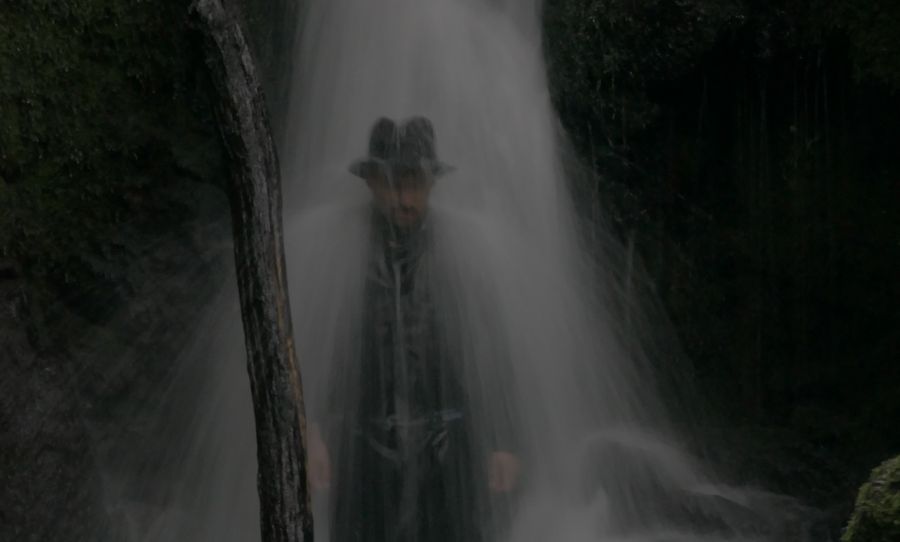
Happy: ‘In Ether’ features a mesmerising blend of electronic and acoustic elements. Could you elaborate on your approach to production, and how you utilised these contrasting textures to create an immersive sonic experience?
Kid Lazuras: Of course! Songs like ‘Fall For The Break’ and ‘Words Are Just Another Way To Hide’ were made at the piano, but all the others were initially made digitally, which is my normal starting point.
At first I have something to express and make it all there and then on my computer, which means the first sounds are always electronic.
So a lot of the production happens before there’s any acoustic instruments involved. In fact I often start by making a soundscape that beds the whole thing.
The soundscape is the thing I’m feeling and everything grows from there. After all that is when acoustic elements get involved, but they rarely treat the electronic elements as guides.
I think with the drums in ‘In Ether’ that might be most noticeable – the drums aren’t copying the electronic beat, they’re working with it to make something else.
It gives me these grooves and sequences and effects that I really like, as if you’ve got two drummers in a vague kind of call and response.
Generally I really like having both electronic and acoustic drums in a track, and I can’t really explain what it is. I think I remember seeing Massive Attack do it – I saw them a few years ago and they had two drummers, one acoustic and one electronic.
They sounded amazing. Maybe I just stole their idea. Really though I think it’s more that merging electronic and acoustic just gets to the core of the feelings I’m trying to express a bit more.
When things are just acoustic or just electronic there can be a purity in the sound, like you’re expressing the emotion perfectly, but not the emotions about the emotion, or the moods that’d give rise to the emotion.
But combining the two means I have the honest emotion, as well as the mood or experience that’s given rise to the emotion too.
But even though I start by just making the sounds that are the thing I’m feeling, the whole process takes ages. I mean, it’s August 2023 and this music has been complete and ready to release since 2021.
I’ll make the song in one sitting, but then I’ll spend months and months fiddling with it, adding acoustic elements, manipulating the sounds, just trying to make sure it’s true to its source.
So the source feeling of each of these songs would’ve been nearly three years ago. It’s taken me so long to release it because the pressures of life made me feel I couldn’t prioritise music.
But the more I realised it’s what makes me happy, the more I realised I have to.
Happy: The album engages with weighty subjects like refugees, capitalism, and the search for happiness. How did you manage to infuse these themes with both introspection and a sense of hope, ensuring they resonate deeply with listeners?
Kid Lazuras: Interesting question! I find it alienating living in a country that seems to lack basic love and empathy for people and their struggles.
I remember seeing a photo of a refugee, a dead toddler washed up on the beach. The way people spoke about it – it really made me realise that our culture asks us to wear these kind of goggles that remove your capacity to see a human as a human.
It’s almost like there’s a psychological shift as soon as we categorise someone as ‘immigrant’ or ‘refugee’ – when people hear those words, they think ‘problem’ first and ‘human’ last.
So when writing ‘Refuge’, I was fuelled a lot by my anger at our treatment of these people who’ve escaped from hell only to find themselves demonised, dehumanised, and terrorised, and wanting to try and write from that perspective.
I felt it would be more powerful to try and speak from that experience, what it must feel like to seek refuge and find only danger. And to be left unable to fight it, because if you do, you only get punished, and are then used to justify the ongoing brutality of western states against these folks.
I think one of the major questions ‘Utopia’ as an album is interesting is in alienation. And that can manifest in so many different ways. Individualised capitalist structures are alienating – they detach us from nature, from each other, and so from ourselves.
That alienation is epitomised by the refugee crisis: how alienating that experience must be, but then as an observer of it, how alienating it is to see ‘my’ culture treat others in such a way.
And then in turn the refugee crisis is epitomised by the necessary structures of authoritarian scapegoating that seem to always come hand in hand with neoliberalism. I guess the hope comes in the realisation of collective strength.
The evils we see, the pains we feel, can be confronted and overcome if people come together with love.
Happy: The album artwork and visuals depict a figure amidst contrasting natural landscapes. How does this visual narrative mirror the emotional and sonic journey you’ve constructed in ‘Utopia’?
Kid Lazuras: Whilst I’ve tried to convey personal things in a way that speaks to other people’s experiences too, the album ultimately is a journey that reflects the journey I went on to come to accept myself and my world.
All the emotions of my first 21 years here are packed into an hour of music. And ultimately it’s an hour of music that’s about trauma and alienation, but also acceptance and growth, learning yourself and finding value in yourself.
The artwork for me really reflects that. We did a photoshoot in probably my favourite place on earth. It’s this little woodland valley on Dartmoor, in between a reservoir and the river Dart. It feels like another world, or something out of the deep past.
I’ve talked a lot about alienation from myself and the world – but those photos were taken in the place I understand and that understands me. It feels almost like a spiritual connection, two distinctly different things that feel so far out of place in the world, but that see and know each other.
It’s like a little sanctuary. So it made sense to me that the photos were taken there: the album is a process of self-learning and self-acceptance, and that’s the place where that process feels possible.
Happy: Ultimately, ‘Utopia’ captures a sense of human strength and vitality even in the face of darkness. How do you envision your music inspiring listeners to engage with their own challenges and find their own paths to redemption and acceptance?
Kid Lazuras: That’s tricky! I’m not sure I’d ever inspire anyone, but I know I wouldn’t be alive if I hadn’t taken the journey that ‘Utopia’ tells.
I hope that I’ve found a way to tell that story that helps make sure the people who need to hear it know that they’re not alone, they are understood, there are always people who care, and they have far more strength and power to confront themselves and their world than they imagine.
Betterment requires acceptance and acceptance requires reflection, but proper reflection is only possible when you know there are people who care about you.
Those changes don’t happen overnight, it’s a lifelong process and something I’ll probably still struggle with when I die, but knowing I am not alone, there are people who understand, people who care, gives me the strength to accept, grow, and move on.
Happy: Lastly, what makes you happy?
Kid Lazuras: Songs about sandwiches.
